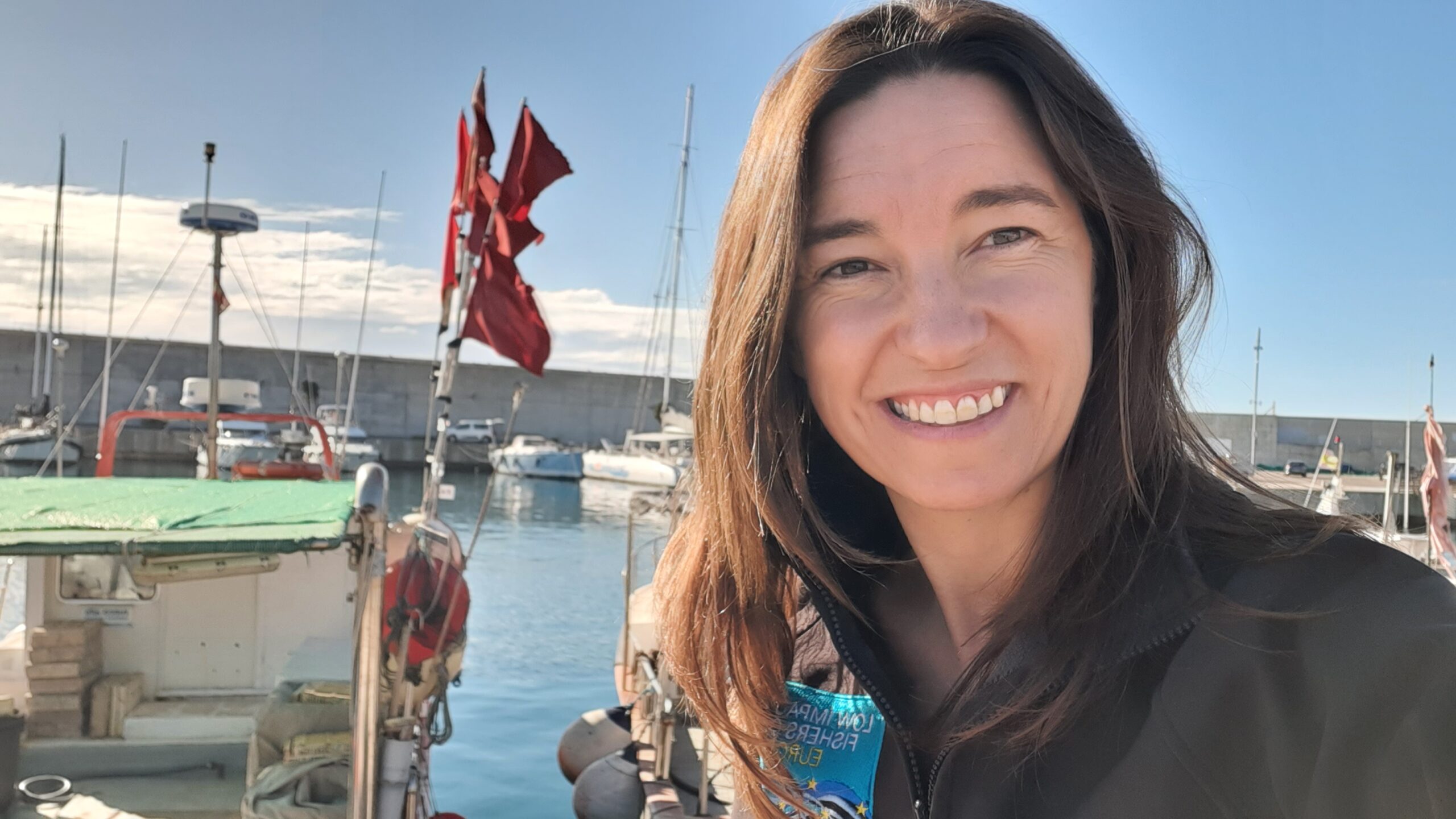Izvršna tajnica Marta Cavallé govori o svojoj karijeri i budućnosti SSF-a
8. ožujka bio je Međunarodni dan ženskih prava. Kada bi bilo bolje vrijeme za razgovor s našom novom izvršnom tajnicom Martom Cavallé o njezinoj karijeri i budućnosti SSF-a?
Možete li nam reći nešto o sebi i kako ste se uključili u rad s malim ribarstvom (SSF) i u program LIFE?
Moja strast prema moru usmjerila me prema karijeri morskog biologa. Međutim, nešto je nedostajalo; društvene i antropološke znanosti također su me zanimale i bile su važne za moj vlastiti pogled na svijet. U ribarstvu sam otkrio tu savršenu ravnotežu između ta dva pristupa. Sklapanje prijateljstava s ribarima i rad s njima došli su mi prirodno i potpuno sam se zaljubio u ribarstveni sektor.
Godine 2008. imao sam čast upoznati Antonija Garcíu Alluta, jednog od “očeva” zajedničkog upravljanja u Europi, i saznati o radu Zaklade Lonxanet u Galiciji. Bila je to ljubav na prvi pogled; njihov rad i pristup zaista su me dotaknuli i činili su mi se ključnim elementom koji nedostaje u upravljanju ribarstvom. Stoga, kada mi je Antonio 2011. ponudio priliku da se pridružim njihovom timu, ostavio sam sve iza sebe i bez ikakvih grižnji savjesti preselio se u Galiciju. Izravan rad s malim ribarskim zajednicama bio je obogaćujuće iskustvo, i osobno i profesionalno. Ovo je bilo moje pravo sveučilište.
Strastveno sam se zainteresirao za razumijevanje i prikupljanje tradicionalnog ekološkog znanja ribara, promicanje pristupa odozdo prema gore i kolektivnog razmišljanja. Također sam naučio kako upravljati sukobima! Rad je doveo Lonxanet do koordinacije mreže malih ribara u Sredozemlju. To se poklopilo s procesom reforme ZRP-a i bili smo uključeni. Godine 2012. Greenpeace nas je zamolio da vodimo sjednicu na ’Prvom europskom kongresu obrtničkih ribara“ kako bismo pomogli ribarima u sektoru da shvate kako mogu poboljšati svoje buduće izglede. Imao sam čast voditi sjednicu na kojoj su svi delegati SSF-a jednoglasno odlučili o osnivanju programa LIFE. Bio je to vrlo uzbudljiv trenutak! Tri godine kasnije, ponovno sam upoznao direktora programa LIFE Jerryja Percyja i on me zamolio da se pridružim programu LIFE kao koordinator za Mediteran; još jedna odluka u mom životu koju sam donio bez oklijevanja!
Kakvu ulogu, po vašem mišljenju, ima malo ribarstvo u održivom razvoju i kako se ribarima može bolje pružiti podrška?
Iskreno vjerujem da mali ribari mogu i trebaju biti akteri promjene za održivi razvoj sami po sebi. To je nekako u njihovoj proizvodnoj logici i stoga je samo pitanje stvaranja odgovarajućih uvjeta da mali ribari postanu subjekti s malim utjecajem i čuvari mora. Međutim, prevladavajući sustav, sa svojim pristupom od vrha prema dolje, ne samo da je otuđio sektor od njihove suodgovornosti, već je i promovirao individualistički pristup. U međuvremenu, tijekom godina, neupravljana industrijalizacija sektora potvrdila je “zakon najjačeg” i na moru i u lukama.
Da bi održivi razvoj postao stvarnost, moramo vratiti SSF u središte politika i, hitno, usvojiti diferencirani pristup upravljanju ovim vitalnim sektorom. Paralelno s tim, moramo regenerirati kolektivni pristup, temeljen na istinskoj suradnji umjesto zbroja pojedinačnih pristupa, te promovirati vodstvo temeljeno na postizanju općeg dobra. Također su nam potrebni novi pristupi upravljanju, a zajedničko upravljanje može biti ključni alat za omogućavanje zajedničke odgovornosti, kao i potrebnog učinkovitog i prilagodljivog upravljanja.
LIFE pokušava stvoriti uvjete za sve ovo: podržati SSF organizacije i izgraditi njihove kapacitete za ovu tranziciju, istovremeno promičući pravedne pristupe i stvarajući politički prostor za njihov napredak.
Kako vidite ulogu žena u malom ribarstvu?
Uloga žena oduvijek je bila važna, vitalna je i danas te je ključna za budućnost sektora. Osim njihove uloge na moru, u trgovini i preradi, u pružanju podrške u lukama, u uredu i kod kuće, trenutno vidim i mnoge žene koje igraju ključne vodeće uloge, vodeći sektor prema stvaranju bolje budućnosti. U mnogim zajednicama vidim strastvene žene kao posrednice kolektivnog razmišljanja i suradnje, osnažujući i ujedinjujući mali sektor u potrazi za rješenjima, druge koje odvajaju vrijeme da predstavljaju sektor na političkim forumima, postaju most s drugim dionicima, pa čak i vode u izazovu generacijske obnove sektora. Uloga žena daleko nadilazi ono što većina ljudi zamišlja; one mogu biti ključni inovatori u suočavanju s novim izazovima s kojima se suočava budućnost sektora. Moramo ih i dalje osnaživati, učiniti njihove višestruke uloge vidljivima i prepoznatima te im pomoći da osiguraju svoja zaslužena prava i pristojne radne uvjete potrebne za procvat sektora. Sve vrijeme moramo se i dalje zalagati za širu društvenu promjenu prema uključivosti, jednakosti i pomirenju u obitelji.
Kakva je po vašem mišljenju budućnost SSF-a i koje su neke od ključnih akcija koje treba poduzeti kako bi se osigurala njihova dugoročna održivost?
U Europi se sektor ribarstva mora prilagoditi promjenjivom kontekstu i transformirati. Klimatske promjene, pandemija i ruska invazija na Ukrajinu, zajedno s procjenom 10 godina trenutne Zajedničke ribarstvene politike, pokreću promjene koje zahtijevaju transformaciju sektora ribarstva. Razumljivo je da to izaziva strah u mnogim dijelovima sektora, ali moramo iskoristiti ovu priliku kako bismo napravili prijelaz prema našoj viziji pravednog ribarstva, zdravih mora i živahnih zajednica. LIFE je i nastavit će postojati kako bi se osiguralo da mali ribolovni resursi imaju odgovarajući prostor za zajedničko osmišljavanje budućih scenarija i kako bi se nastavilo pokazivati da je ribolov s niskim utjecajem na mali ribolovni resurse ključni dio rješenja.
Kako bi trebala izgledati budućnost LIFE-a?
Zamišljam da će LIFE nastaviti rasti kao snaga dobra. Izrasti u kohezivnu, uključivu, dobro upravljanu i financijski stabilnu europsku krovnu organizaciju, sastavljenu od snažnih posvećenih nacionalnih i lokalnih organizacija malog ribolova, uključujući sve veći broj organizacija proizvođača malog ribolova. To je budućnost u kojoj su članovi LIFE-a akteri promjene, pokazujući svoj doprinos društvu kao proizvođači s niskim utjecajem, s pravom glasa u europskim politikama, s pravednim pristupom resursima i tržištima, uključeni u zajedničko upravljanje svojim ribolovnim područjima, osiguravajući pristojne uvjete za život, gdje su žene vidljive i priznate, a mladi se pridružuju sektoru jer vide dobru budućnost.

